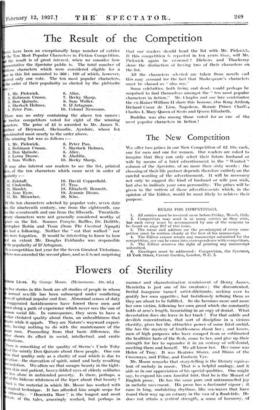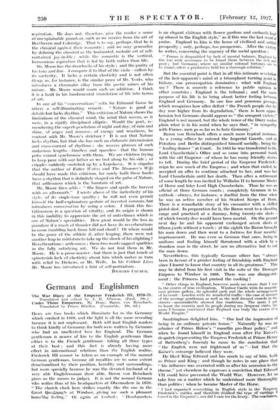Flowers of Sterility
libate Lives. By George Moore. (Heinemann., 10s. 6d,) E five stories in this book are all studies of people in whom. normal sex-life has been submerged under conflicting yes of spiritual impulse and fear. Abnormal senses of duty exaggerated fastidiousness have forced these men and men along a path of experience which never sees the 'sup of on social life. In consequence, they seem to have a "liar etiolated quality about them, an unhealthiness that ruts while it appals. They are Nature's wayward experi- ts, having nothing to do with the maintenance of the Ian race. Proceeding from that basic. difference, the her shows its effect in social, intellectual, and erotic ificat ions.
There is something of the quality of Sterne's Uncle Toby• of the saintly Don Quixote about these people. One can ne that quality. only as a clarity of soul which is due to nation-the starvation of spirit, mind and body resulting tn isolation. . We often see that meagre beauty in the tight- ixt1 skin and _patient, heavy-lidded eyes of elderly celibates lire alone in tinfricnded poverty. Is there, perhaps, a t (Attie hideous whiteness of the leper about that beauty.? . Such is the material In which. Mr. Moore has worked with magical -technique. - It has Afforded him ample scope for Henrietta Marr is ; the longest. and . most: "(Ate of the tales,-- amazingly worked; but • perhaps in - manner and characterization reminiscent of Henry, James. Henrietta is just one of his creatures ; the discontented, fretful bourgeoise turned artist-dilettante, seeking ever to gratify her own appetites, but fastidiously refining them as they are about to be fulfilled. So she becomes more and more her own victim, following her own greed which she constantly holds at arm's length, luxuriating in an orgy of denial. What devastation does she leave in her track ! For that subtle and devilish concentration, that sort of discipline in a vicious chastity, gives her the attractive power of some fatal orchid., She has the mystery of fruitlessness about her ; and lovers, men of high purposes who have escaped from or sublimated the healthier lusts of the flesh, come to her, and give up their strength for her to squander it in an ecstasy of self-denial, mocking them and herself. We all know her. • Her name was Helen of Troy. It was Beatrice Sforza, and Diana of the Crossways, and Felise, and Eustasia Vye.
- Mr. Moore remarks that story-telling is the literary equiva- lent of melody in music. That is a helpful analogy, and it aids us in our appreciation of his special qualities. One might say, to expand his own fanciful hint, that he is the Mozart of English prose.- He has the same pure and untrammelled joy in melodic movement. His prose has a horizontal vigour ; it runs in long, undulating rhythms, like sea-waves that have found their-way up an estuary-in the van of a flood-tide. He does not -attain a:vertical strength, a sense of harmony, of -
aspiration. He does not, therefore, give the reader a sense of unexplainable grandeur, such as we receive from the art of Beethoven and Coleridge. That is to say, perhaps, that he is the classical against their romantic ; and we may generalize by defining the classical as the horizontal, melodic art of self- cantained ; while the romantic is the vertical, harmonious aspiration that is fed by faith rather than life.
Mr. Moore has the drawbacks of his style ; and the purity of his tone and line--I compare it to that of the viola—suffers by its austerity. It lacks a certain elasticity and is not often Et-up, as, for instance, is the similar prose of Mr. Yeats, who introduces a chromatic alloy from the poetic mines of his nature. Mr. Moore would scorn such an addition. I think it is a fault in his fundamental translation of life into terms of art.
In one of his "conversations" with Sir Edmund Gosse he utters a self-illuminating remark. " Nature is good at details but lacks rhythm." This criticism of Nature shows the limitations of the classical mind, the mind that moves, as it were, in a rigidly disciplined elliptic. Would the poet, re- membering the superb pendulum of night and day, of rain and shine, of anger and remorse, of energy and weariness, be content with Mr. Moore's stricture.? It is not that Nature Jacks rhythm, but that she has such an elaborate intermission and cross-current of rhythms ; she weaves phrases of such audacious lengths—timeleis and spaceless —that the human pulse cannot synchronise with them. We are children trying to keep pace with our father as we trot along by his side ; or cripples suddenly snatched up by a Lopokova. It is singular that the author of Esther Waters and The Mummer's Wife should have made this criticism, for surely both these books have a rhythm that is definitely shaped on the pulse of Nature, that artlessness which is the fountain of art.
Mr. Moore then adds : " She lingers and spoils the harvest with an aftermath." I wrote above of the inelasticity of his style, of its single-tone quality : he will not even permit himself the half-explanatory gesture of inverted commas, but introduces conversation by using a colon. I think this fas- tidiousness is a question of vitality, and its origin is shown in this inability to appreciate the art of anti-climax which is one of Nature's specialities. How great would be the loss in grandeur if a crash of thunder did not have its reverberations to come tumbling back from hill and cloud ! Or where would be the grace of the athlete if, after leaping, there were not another leap in miniature to take up the shock of his alighting? Reverberations ; artlessness ; these two words suggest qualities in the fully satisfying art. We do not find them in Mr. Moore. He is a prose-master—but there is just that touch of spinsterish lack of elasticity about him which makes us turn with relief to Dickens, or Mr. Wells. In his Celibate Lives Mr. Moore has introduced a hint of self-portraiture.
RICHARD CHURCH.











































 Previous page
Previous page